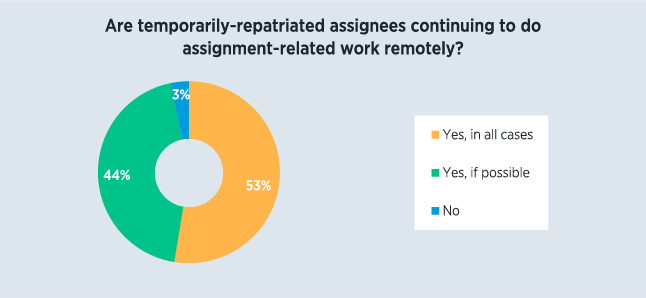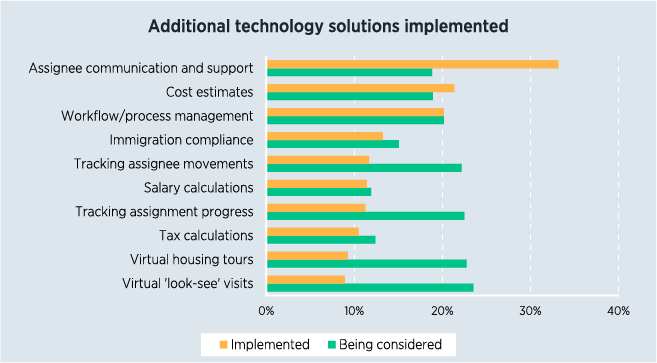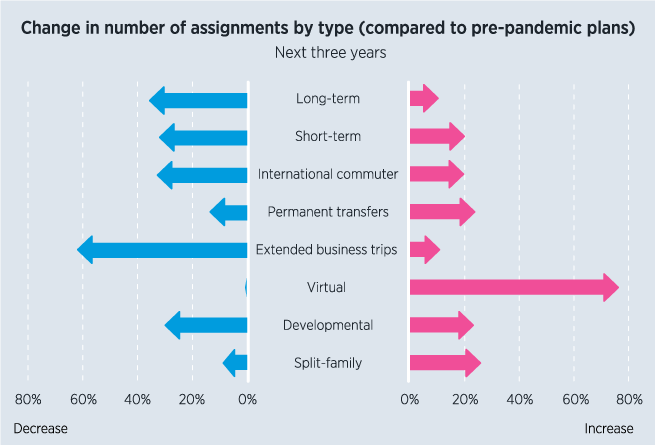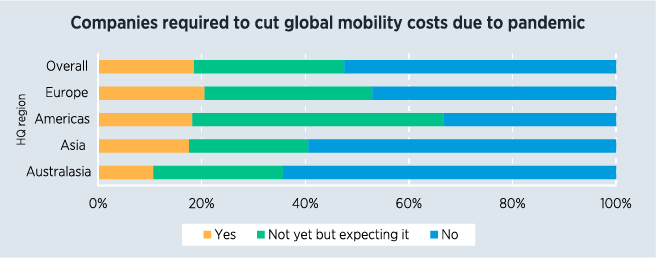When the WHO officially declared the coronavirus outbreak a pandemic on 11 March 2020, few would have predicted the extent to which the world would change, and the speed at which the change would happen. Border closures and travel restrictions had an immediate impact on global mobility (GM) teams, as they had to deal with upheaval in their own situations as well as helping internationally mobile staff navigate the crisis. ECA's recent Global Mobility and Covid-19 Survey investigated the impact of the pandemic and the resulting changes, some of which will be felt into 2021 and beyond.
Moving into the new 'normal'
The varying impact of the virus across the globe required a nuanced approach for many companies, with some assignments able to continue but others requiring extra steps. Over half of respondents said their company offered temporary repatriation to at least some of their expatriates, while a slightly higher percentage have at least some assignments which continued as usual. On average, companies have repatriated around a third of their staff either temporarily or permanently during the pandemic, although a significant proportion of companies did not repatriate any staff at all.
There remains a great deal of uncertainty as to exactly how long it will take before things return to 'normal'. Most companies are still planning new assignments for when global travel restrictions are lifted, and many countries around the world have already begun the process of reopening. However, in an increasing number of locations, further spikes in cases have forced the return of lockdown measures. Despite these challenges, over half of respondents to this survey felt their company had responded well to the pandemic. Armed with experience gained from the events of 2020 so far and new procedures in place, GM teams should now be better placed to cope with the new normal.
Technology enabled rapid adaptation
Companies which already had technology solutions in place to manage some aspects of their mobility programmes have been better placed to weather the storm, with these respondents more likely to have felt their company responded well to the pandemic.
Stay-at-home guidance has been in place across the globe, affecting GM teams and expatriate staff alike. Remote working technology has proved to be a lifeline during the pandemic, allowing some aspects of business to continue almost as normal, something that would simply not have been possible only a few years ago.
Employees who returned home temporarily, as well as those unable to travel to their host location to begin an assignment, have done assignment-related work from the home country, minimising the impact on the business.

However, this has in turn given rise to new issues for GM teams to contend with. There has been, or will be, an increasing need to track the whereabouts (including entry and arrival dates) of employees working remotely from a country that is not their normal country of employment, so that companies can review income tax, payroll and social security implications with their tax providers. In addition, visas may also be invalidated due to the change in place of work from the one stated in the visa application.
Technology has not just enabled more efficient remote working. One of the primary concerns for many companies has been to support the mental wellbeing of assignees through this time and there has been a need for increased engagement with assignees to discuss their wellbeing, as well as any changes to assignments. To this end, solutions for communicating and supporting assignees has been the most common additional technology implemented as a result of the pandemic.

Technology solutions for tracking assignee movements and assignment progress are two of the most common solutions under consideration, with the pandemic highlighting a need for having systems in place to know where people are and how close they are to the end of their assignment in order to inform repatriation decisions.
Assignment numbers will take time to recover
Through repatriations and new assignments being unable to go ahead, many companies have seen a reduction in assignment numbers.
Most are still planning new assignments for when they become possible again, although immigration issues for such assignments were ranked as the biggest challenge for GM teams both now and looking ahead to the future. With global travel still a long way from returning to normal, shorter and easier to initiate assignment types are most likely to have been postponed indefinitely. There is a general expectation that numbers of most assignment types will return to pre-pandemic levels in six to 12 months, with numbers of long-term assignments expected to take up to two years to get back to how things were. However, a significant proportion of respondents think it may take longer.

There is less optimism than before, as more companies are forecasting decreases rather than increases in numbers for most assignment types compared to their pre-pandemic plans. In addition to travel restrictions, a need to cut costs will undoubtedly reduce assignment numbers further. The main exception to this is virtual assignments, where assignees carry out their role remotely from the home country. This type of assignment would be largely free from travel restrictions and could prove significantly cheaper than other assignment types, although it would be subject to practical limitations of working across time zones, as well as the tax and immigration issues mentioned previously. It remains to be seen whether the pandemic will have a lasting effect on employees' willingness and desire to physically relocate.
Change has been widely felt
Changes have already been made to mobility programmes, policies and processes, with two-thirds of respondents stating that changes to their mobility programmes had been implemented already or were expected to be implemented as a result of the pandemic. In some cases, the changes brought about by the pandemic will simply be an acceleration of existing trends, such as moves towards automation and remote working.
Costs are once again in focus, with almost half of respondents already having been told to cut mobility costs, or expecting to be told to do so.

The most common way of reducing costs has been to have fewer assignments, and going forward there is expected to be a shift towards assignments based on business need, with developmental assignments declining. Many companies without an existing crisis plan, particularly those with fewer assignees, are now developing one. As well as changes made by companies themselves, sudden changes in government regulations have been a particularly challenging feature of the pandemic so far and are expected to continue to be challenging in the coming months.
Conclusion
The challenge of the Covid-19 pandemic continues to evolve. Issues surrounding the basics of repatriation and remote working have subsided, replaced with concerns over the tax implications of the new ways of working, as well as budget cuts in light of imminent recession. The global situation is still uncertain, with the prospect of sudden changes in regulations causing difficulties in planning new assignments, with shorter assignment types rendered impractical by travel restrictions and quarantine regulations. However, many changes to mobility policies and processes have been put in place already, with more to come, and the majority of participants felt their organisation had handled the issues well so far. This experience will be vital in adapting to the ever-changing global landscape.